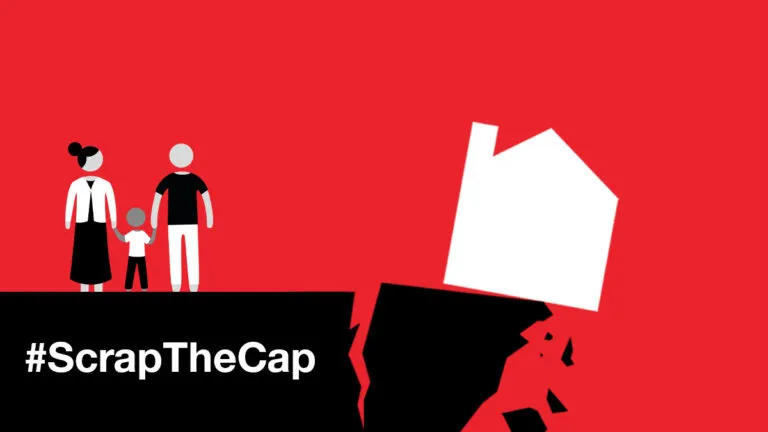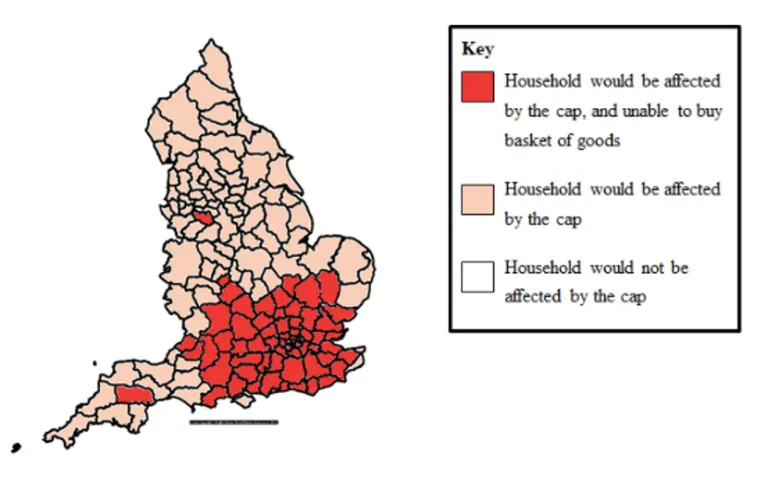Capped for Christmas: why the benefit cap needs to go
Published: by Steph Kleynhans

The pandemic has affected us all. But it has not affected us all equally. We know that many families have struggled to make ends meet throughout the pandemic and with 4.6 million households now on Universal Credit, the economic impact will be felt for some time.
Despite this, the government is now considering whether to end some of the desperately-needed changes it made at the start of the pandemic. Given the ongoing economic impact, this would be disastrous for many. But to make sure the support provided can continue to be accessed by those who need it, they also need to act now to prevent the benefit cap from restricting income in time for Christmas.
What’s happening?
The government acted fast at the beginning of lockdown by granting a vital £20 per week for everyone on Universal Credit following a four-year freeze that saw benefits left far below the true cost of living.
They also lifted housing benefit for private renters, (Local Housing Allowance, or LHA), back up so that it covered the bottom 30% of rents in each local market. This undoubtedly prevented many people from losing their homes during the height of the pandemic. The government must keep LHA in line with rents and the Universal Credit uplift into next year.
But right now, the government is debating whether to reverse the Universal Credit uplift, threatening to cut the growing number of benefit claimants’ income by £1040 per year in April.
With new large-scale redundancies being announced regularly, unemployment rising and claims to Universal Credit continuing, now is not the time to remove support to low income families. That is why Shelter has joined forces with Joseph Rowntree Foundation (JRF) and sixty other charities to ask the government to #KeepTheLifeline.
JRF’s research shows that 16 million people are set to lose £1040 from their annual budget overnight. This will tip an additional 700,000 more people into poverty and an estimated half a million more into deep poverty (defined by JRF as more than 50% below the poverty line).
For those who are already struggling to stay afloat, even with the uplift, removing it will create severe hardship.
We cannot let this happen. The government must commit to making this £20 per week uplift permanent.
The benefit cap is undermining the government’s support
Not only must the government ensure that all families do not lose this in April, but they must prevent some families from losing it, and more, in time for Christmas because of the benefit cap.
For those who had their Universal Credit claim accepted at the start of the pandemic, many will have been exempt from the benefit cap. However, they will now be facing the prospect of being capped, if they have not found new work, just in time for Christmas. For most, this will mean them losing at least the £20 uplift, and in many cases, much more than this.
The current benefit cap limits the maximum amount that an out-of-work household can receive, regardless of its size, to £20,000 a year outside of London and £23,000 inside the capital (a total that is slightly less for single people).
That’s well below the cost of living. It was intended to encourage people to find employment or move to a cheaper home – both of these options are much more difficult this year and in this new national lockdown, as we balance on the precipice of the biggest jobs crisis the country has ever faced.
For households who were working consistently before the pandemic, some may have been exempt from the benefit cap during the first nine months as part of the grace period. For these households, these nine months will be ending in time for Christmas, and they will see their income cut.
Job losses on the horizon could make matters worse
In the weeks leading up to the first lockdown, many businesses were already announcing redundancies and many employees were losing hours leading them to claim Universal Credit. Even with the new furlough scheme, in the first two weeks of lockdown, there were nearly a million new applications made to Universal Credit.
There is little sign of the jobs market recovering**.** Unemployment rates have continued to rise as we saw the UK’s unemployment rate hitting 4.8% in the three months to September, up from 4.5%. It will continue to be extremely difficult escaping the cap by finding a new job.
As we’ve shown before, the high cost of housing can mean it leaves families with very little left once rent is paid. This is even with the additional £20 per week households are receiving through the Universal Credit uplift.
To put these amounts in context, we compared them to the actual cost of living. The results are shocking: a capped one-parent family with four children does not receive enough to cover the cost of essentials (such as rent, bills, food, toilet roll) in almost half (43%) of the country.
The map below shows areas in England where a one-parent family with four children would be unable to afford essential costs

This relic of the benefit system is completely undermining the government’s good work, and is causing people to go into debt and extreme hardship. It already has impacted tens of thousands of new households during this pandemic as we saw the numbers of households benefit capped double between February and May.
But there is a very real danger of there being a whole new wave of households being capped just in time for Christmas. Those households will lose out on the £20 uplift prematurely, and more.
If it is kept in place, the benefit cap will almost certainly increase the number of households made homeless as a result of the crisis, with knock-on impacts on children. This is not to mention council finances – who will bear the brunt of the cost of accommodating local families, often in expensive temporary accommodation.
Alongside confirming the LHA rates will at least stay at the 30th percentile of local rents, the government needs to confirm that the £20 uplift to Universal Credit will stay to keep the lifeline so many desperately need. And the benefit cap must also be removed to make sure households can actually access the essential support families desperately need to stay afloat during the pandemic.
The benefit cap is making families homeless during the pandemic. Thousands have already been hit, thousands more are going to be capped just days before Christmas. We’re calling on the minister in charge, Therese Coffey MP, to do the right thing, keep benefits in line with rents and scrap the cap. You can join us and tweet the minister today.